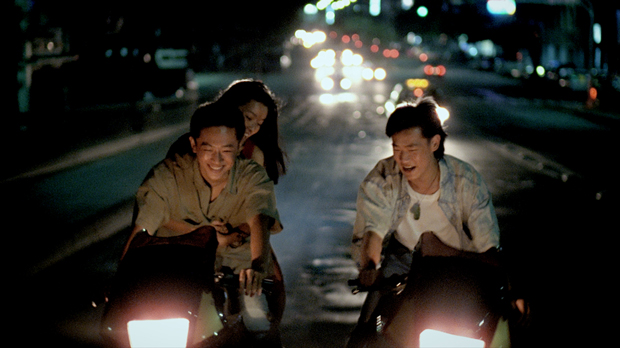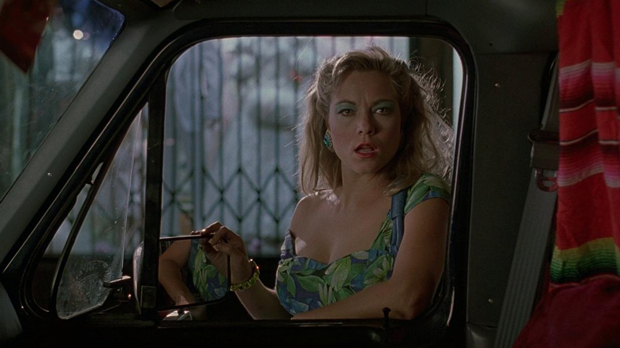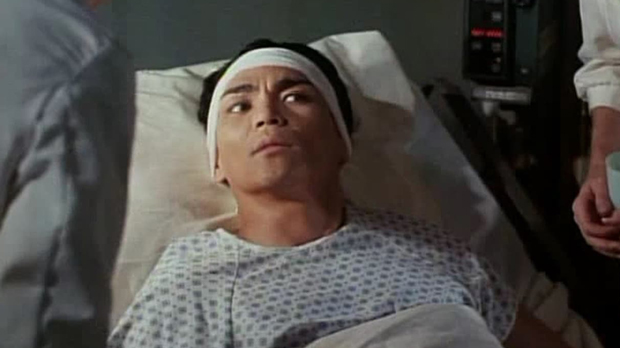 Rebels of the Neon God (1992) Big World Pictures/Drama RT: 106 minutes No MPAA Rating (language, some violence, some sexual content) Director: Tsai Ming-liang Screenplay: Tsai Ming-liang Music: Huang Shu-Jun Cinematography: Pen-jung Liao Release date: July 3, 2015 (Philadelphia, PA) Cast: Lee Kang-sheng, Chen Chao-jung, Jen Chang-bin, Wang Yu-Wen, Miao Tien, Lu Yi-Ching. Spoken in Mandarin w/English subtitles
Rebels of the Neon God (1992) Big World Pictures/Drama RT: 106 minutes No MPAA Rating (language, some violence, some sexual content) Director: Tsai Ming-liang Screenplay: Tsai Ming-liang Music: Huang Shu-Jun Cinematography: Pen-jung Liao Release date: July 3, 2015 (Philadelphia, PA) Cast: Lee Kang-sheng, Chen Chao-jung, Jen Chang-bin, Wang Yu-Wen, Miao Tien, Lu Yi-Ching. Spoken in Mandarin w/English subtitles
Rating: *** ½
First of all, I love this movie’s title. Rebels of the Neon God, it just sounds cool, don’t you think? That being said, I now have a rhetorical question. How have I not heard of Tsai Ming-liang? He’s regarded by critics as one of the finest filmmakers in the world. He has several titles to his credit including Vive L’Amour, The River and Stray Dogs yet I’ve not seen a single one of his movies which brings me back to Rebels of the Neon God, finally being released in the US twenty-three years after its debut. The trailer caught my attention with its vivid colors and an electric bass line score that evokes John Carpenter. The same piece of music appears at various times throughout the movie, but never feels redundant because it fits the mood so perfectly.
Rebels of the Neon God is an unusual film because it doesn’t have a plot, at least not in the usual sense. Nothing really HAPPENS per se. It centers on a group of disparate, disillusioned youths living in Taipei. Tsai’s film follows them over the course of a few days and nights. Sometimes they find themselves in the same place at the same time. But if asked what Rebels of the Neon God is ABOUT, I’d say it’s about urban angst, the emptiness of youth culture and the psychic toll of living in a big city.
If I had to call anybody the main character, it would be Hsiao-kang (Lee), a character who appears in several of Tsai’s films. In Rebels of the Neon God, his first appearance, he’s a cram school student living with his parents. His father (Miao) drives a taxi and barely tolerates his son. His mother (Lu) is an overprotective sort who believes he’s the reincarnation of Nezha, a powerful god in Chinese mythology. Hsiao-kang is something of a social misfit. He doesn’t feel like he fits in anywhere. He has no friends and doesn’t speak to anybody. Unhappy and impulsive, he’s the sort one expects to go on a shooting spree at school.
One day, his father’s taxi is vandalized by Ah Tze (Chen), a petty criminal we first meet in a phone booth (remember those?) breaking into the coin box with his partner-in-crime Ah Bing (Jen). He’s in a relationship with Ah Kuei (Wang), a girl who works at the local roller rink. He doesn’t treat her particularly well. When Hsiao-kang spots Ah Tze later on, he decides to follow and watch him from a distance. He’s right there when Ah Tze and Ah Bing steal consoles from a video arcade (remember those?). He finally gets an opportunity to retaliate for the earlier act of vandalism with an equally arbitrary action.
The thing about Hsiao-kang is that he doesn’t really know why he does the things he does. For example, he drops out of school and pockets the reimbursed tuition money. He then stays out all night, not once letting his parents know what’s going on. He’s a very troubled young man with a definite undercurrent of violence. This is made evident when we first meet him studying in his bedroom. He tortures a cockroach with the point of his compass before putting his hand through the window.
Lee turns in an excellent performance as Hsiao-kang. In fact, all of the acting in Rebels of the Neon God is quite good. But the real star of the film is the visual imagery. It can definitely be described as poetic. It looks like a noir piece with the neon-splashed nighttime scenes as the characters hang out in arcades, diners, alleys and dirty hotel rooms. By day, they ride aimlessly on scooters with blank expressions. Water is a recurring motif in Rebels of the Neon God whether it’s a drenching rainstorm or Ah Tze’s constantly flooded apartment. Tsai makes great use of long takes that express the characters’ longing and sadness. In one scene, he tracks a series of objects (slipper, soda can and cigarette butt) floating in the floorwater in Ah Tze’s apartment.
Even though the movie lacks any real action (except for Ah Tze and his partner running afoul of some dangerous criminal types), it still brims with sheer energy thanks to Tsai’s brilliant visual sense. There’s a deep undercurrent of emotional tension and violence, but never any sort of catharsis or release. There is no final confrontation between Hsiao-kang and Ah Tze. Nothing is really resolved which is precisely the idea behind Rebels of the Neon God. Tsai sets out to reflect real life and as we know, real life bears little if any resemblance to movies. Granted, it’s something of an impressionistic view of real life, but how better to emphasize the ennui and loneliness of urban living.
In its own way, Rebels of the Neon God is a heartbreaking film. It illustrates the idea of how it’s possible to feel all alone amidst a crowd. The characters cross paths, but never actually connect. This is the kind of movie that demands more than one viewing in order to fully absorb its visual poetry and underlying ideas. The score, as I said, is a definite asset. It’s an impressive film and I’m happy that American audiences will finally get to experience it.




